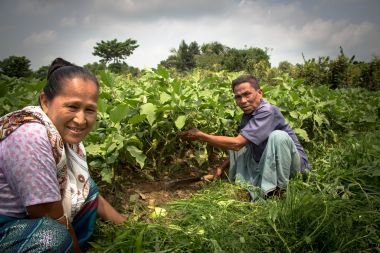#BalanceforBetter
The theme for this year's International Women's Day 2019 is "Better the Balance, Better the World."
From grassroots activism to worldwide action, we are entering an exciting period of history where the world expects balance between genders. We notice its absence and celebrate its presence.
IFPRI contributes to a better gender balance by providing gender-sensitive, research-based policy solutions to reduce poverty and end hunger and malnutrition in developing countries. Attention to gender is an integral part of IFPRI’s work to illuminate pathways to sustainable and inclusive economic development. We realize that even raising the issue of women’s empowerment in agriculture is a sign of progress. Senior Research Fellow Ruth Meinzen-Dick elaborates on this idea in a recent blog, “A decade ago, women’s empowerment in agriculture wasn’t on the agenda.”
As a research institution, we recognize the importance of good data plays in forging a more gender-balanced world. Senior Research Fellow Agnes Quisumbing discusses this idea in her latest blog post, “Data can be sexist. Here’s how IFPRI is fixing that problem.” This is also why IFPRI continues to innovate new tools to measure women’s empowerment and capture missing data about women and girls in all aspects of their lives. Such tools aid our efforts for achieving a better balance, viewable at the WEAI Resource Center.
Here are some additional resources from IFPRI that help move us to better balance and a better world.
STAY UPDATED
- WEAI Resource Center
- Gender-Nutrition Idea Exchange
- Gender and Development Forum
- Gender Highlights from IFPRI Newsletter
JOURNAL ARTICLES
- Transfers, behavior change communication, and intimate partner violence: Post-program evidence from rural Bangladesh
- Women's empowerment in agriculture and agricultural productivity: Evidence from rural maize farmer households in western Kenya
- Context and measurement: An analysis of the relationship between intrahousehold decision making and autonomy
- Engagement of husbands in a maternal nutrition program substantially contributed to greater intake of micronutrient supplements and dietary diversity during pregnancy.
- Does women's time in domestic work and agriculture affect women's and children's dietary diversity?
- An improved way of understanding gendered agriculture-nutrition pathways
- How do agricultural development projects empower women? Linking strategies with expected outcomes
Other Gender-related Publications and Blogs from IFPRI Authors
EVENT
- IFPRI co-hosted, with Mercy Corps, a panel discussion about gender, social barriers to resilience, and household decisionmaking. Read more about the event and listen to the podcast.
- Celebrating Women in Science Slideshow (for International Day of Women & Girls in Science)
INITIATIVES AND PROJECTS
- Gender Agriculture Assets Project (GAAP and GAAP2)
- Gender, Climate Change and Nutrition Integration Initiative (GCAN)
- Agriculture for Nutrition and Health ([A4NH] - A CGIAR Research Program)
N THE NEWS
- IndiaSpend quoted Samuel Scott in an article about how the improvement of women’s education and health services may reduce India’s rampant rates of anemia in women and girls.
- The Indian Express in an article on India’s Integrated Child Development Services program and the exclusion of women with low education from the poorest households quoted Purnima Menon and Kalyani Raghunathan.
- FirstPost in an article about India’s inequalities hampering the country’s economic growth highlighted IFPRI research on stunting rates in women.



